Article 39: Vienna Consciousness Coffee – intangible cultural heritage
In 2011, Viennese coffee culture was honored by UNESCO as an intangible cultural heritage, derived from the spiritual, historical, and cultural values of coffee shops and community life.
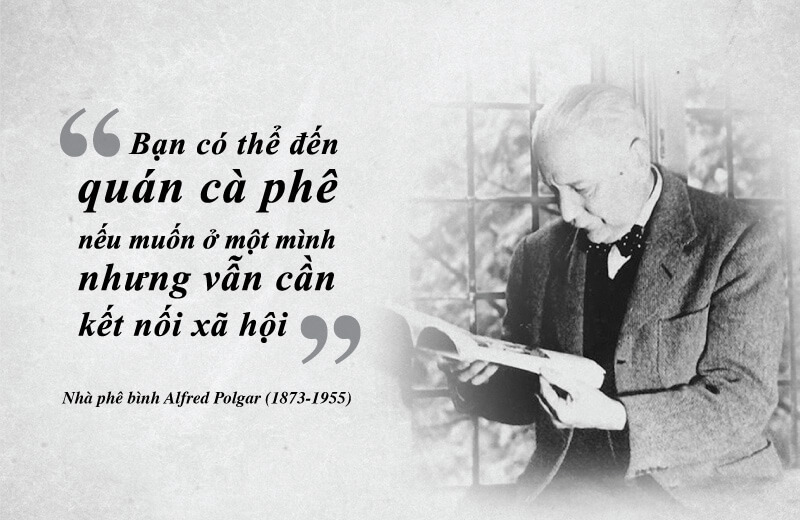
“You can go to a coffee shop if you want to be alone, but still need social connections.” Critic Alfred Polgar (1873-1955)
If French-class coffee was characterized by a luxurious and modern restaurant space, a place to admire and express yourself; Italian style coffee expressed the desire to identify the national soul and national character through the ritual of enjoying a cup of coffee; The Viennese Consciousness Coffee was shaped as a cultural space of the human soul, understood in the sense that people desired to sublimate their destiny through their own thinking.
Cultural space of the human soul
Vienna was the capital of the Austrian empire of the Habsburg dynasty – a multinational, multi-ethnic, multi-lingual empire that led to a heterogeneous human heart. If searching for identity it cannot based on historical genealogy, or national identity, it must be created from a strong desire for a common future. Cafes with the creative dynamics of the beverage, along with the spatial characteristics of arising and manifesting human aspirations, became the place to interpret Viennese consciousness, thought and lifestyle.
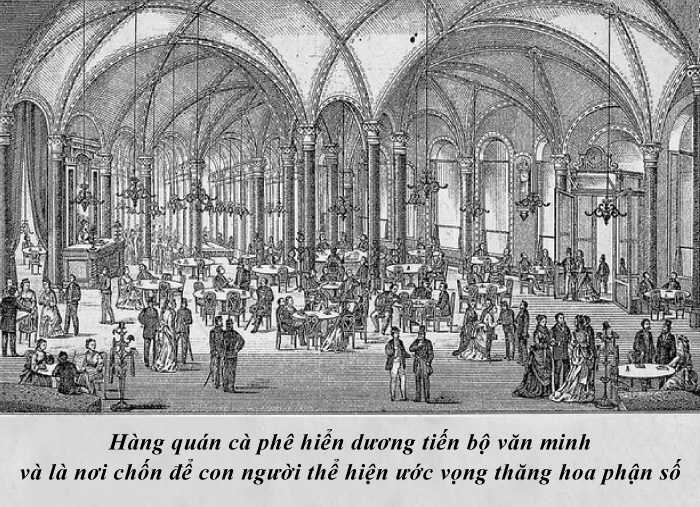
Coffee shops displayed civilized progress and were a place for people to express their desire to sublimate fate
Appearing after the victory over the siege of Vienna – a historic turning point between the East and the West, the Viennese coffee shop initially acted as a space for speech creation, a place for visitors to share thoughts, expressions of heart and attitude of life. From that initial role, coffee shops provided a favorable environment for people to dialogue with themselves and communicate with the community. But communication and dialogue were indispensable conditions in the formation and development of awareness, perfecting personal traits and standards of human behavior.
Conspicuously, Viennese cafes were characterized by space divided into many small premises. The tables and chairs were arranged far apart, and the interior layout created “oases” for each person to reflect and contemplate life and the meaning of life. That is the time to experience life, to live with a world full of quiet desires. But to clarify what I am and what I want to be, it is necessary to have awakening energy, creativity and knowledge. The “Newspaper Library” cafe with hundreds of newspapers and magazines acted as a news center, providing a foundation of knowledge for people to perceive the depth and breadth in the operation of human life. From there, it became clear the future people want to aim for and the super ego people want to grow into.
An important dimension in the process of transcending the self is projecting oneself onto the surrounding human world to uncover the ultimate truth. Regular activities at the cafe, also known as themed coffee, became the material to stimulate people to express their philosophy of life, courageously express themselves and dare to live with beliefs in their ideal worlds. For that reason, coffee shops with specific themes such as literary coffee Café Central, Café Griensteidl, Café Herrenhof… concert coffee Café Frauenhuber, Café Bellevue… art coffee Café Museum, Café Schwarzenberg… philosophical coffee Café Korb, Café Siller… became enlightening symbols of the times. From those cafes emerged illustrious ideas and humanistic schools such as Modernism, Expressionism, Psychoanalytic theory, philosophy of language, Viennese secessionist movement…
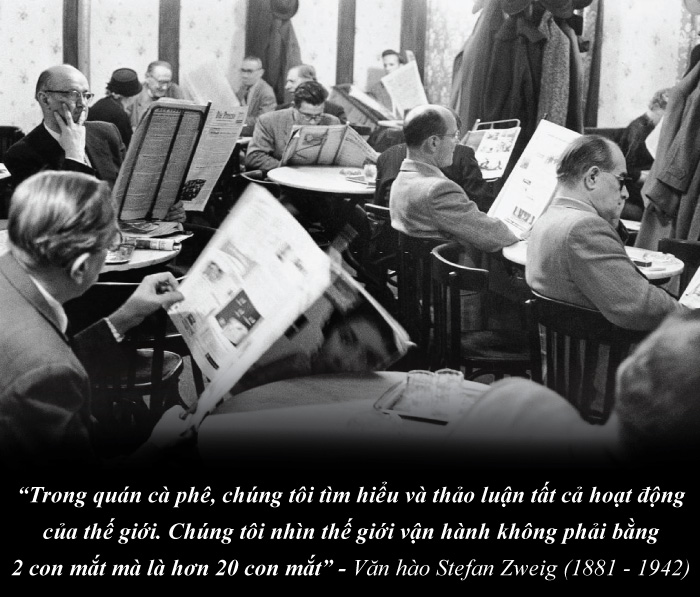
“In the cafe, we learn and discuss all the activities of the world. We see the world in action, not with two eyes, but with more than 20 eyes.” – Stefan Zweig (1881-1942)
Space to sublimate the fate of human life
Besides arranging space and organizing activities, the identity of Vien coffee shop also came from the style and color of the cafe. The style here was the way the staff took care of the guests right from the time of reception and service until the guests left the shop. It was no coincidence that the Viennese considered the cafe their second home. The waiter played the role of connecting and reinforcing the customer’s sense of belonging. They dressed in elegant tuxedos with bows on their necks, and greeted guests at the door by calling their names and titles. The waiter would always remember the information and habits of regular guests – known as “stamgast” – to arrange the right table position, serve the right coffee and cake, moreover provide latest news from the magazine according to the field of interest of the “stamgast”. Therefore, the waiter not only was knowledgeable about coffee but also had the acumen in reading customer behavior, constantly updating news to provide customers with exactly what they wanted.
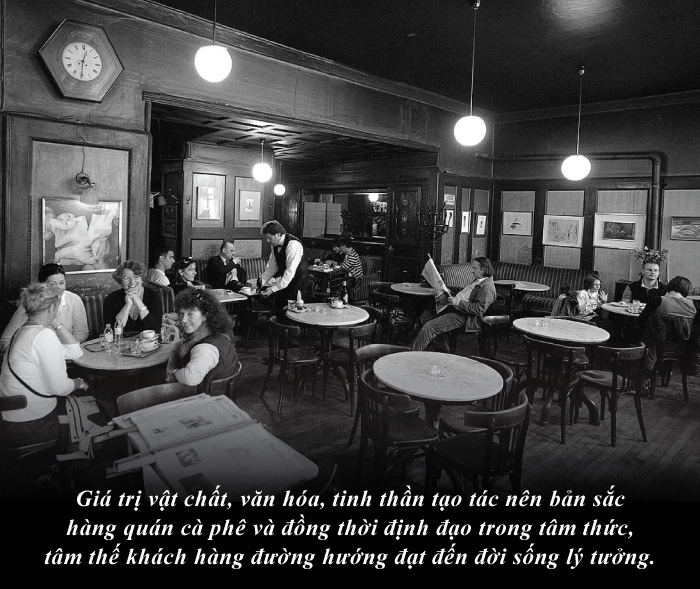
Material, cultural and spiritual values created the identity of the coffee shop and at the same time set the path in the mind and style of the customer towards their ideal life.
Architecture is understood as the overall design layout including both interior and exterior. The architecture creates a space that opens up in the visitor’s senses a distinct superiority. Or it can be said to show the highest level of human aspiration, of the times. Viennese cafes have always been the center of creativity and innovation. Upward-facing dome architecture, luxurious marble tables, large mirror furniture and modern chandeliers, pioneering the use of Thonet chairs, applying steam-bending wood techniques… and reflecting contemporary culture, in harmony with the historical flow, while also symbolizing the dynamism towards a beautiful life, shaping the destination orientation of customers.
If we consider coffee shops as a “space of life”, the characteristics of drinks, dishes, architecture, etc. are tangible physical forms; service style, organization of activities are the cultural foundation; the sense of the ability to sublimate life emerges from the resonance between the symbolic space that transcends everyday life and the transcendent aspiration in the mind of the coffee drinker who is the spiritual astral soul. Material values, cultural values, and spiritual values interact to create the identity of Viennese coffee shops. And when coffee shops define their cultural identity, they also provide or orientate themselves in the minds and hearts of customers, a way to escape the present to reach the ideal life.
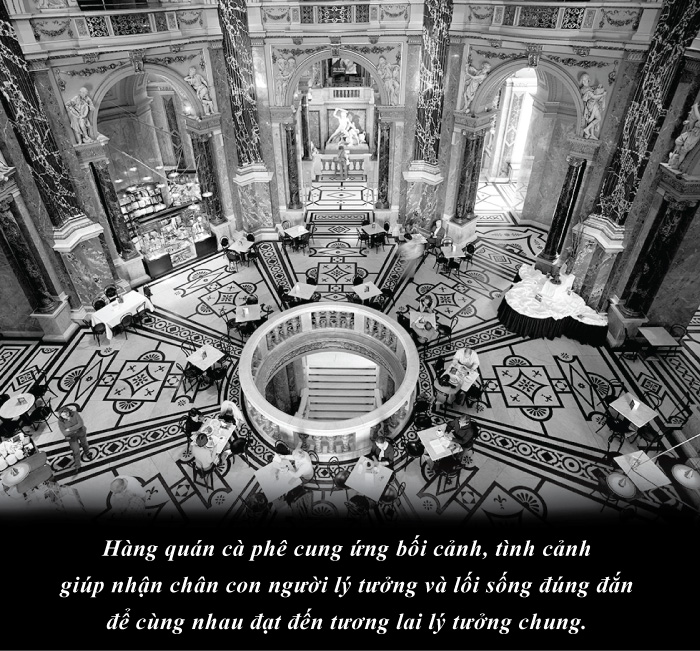
The coffee shop provides the context, the situation that helps to realize the ideal person and the right way of life to achieve the common ideal future together.
Simply put, the entire identity component of the cafe provides the ideal context and situation for people to experience life – realize the self, express thoughts – present the ego, project – realize the ideal self. This is the process of transforming thinking and behavior to transcend from the self to the ideal self. From the discussion of common interests, people will find a common ideal and the right way of life to achieve a common ideal future together. That is also the reason why starting from Viennese cafes were not material industrial creations, but ideas that enlightened the spirit, explored the domain of thought and human personality.
Viennese coffee shops from the place of speech and knowledge gradually became a cultural space containing the consciousness of the century, honoring the fate of people and at the same time contributing to establishing Vien’s position as a one of the cultural centers, academic centers, creative centers… of the world. This was the basic reason for UNESCO to honor the Viennese coffee shop as an intangible cultural heritage.
THE REAL COFFEE
ROASTED ONLY FOR PEOPLE OF WISDOM!
Source: “The Philosophical Way of Coffee” – copyright by Trung Nguyen Legend


